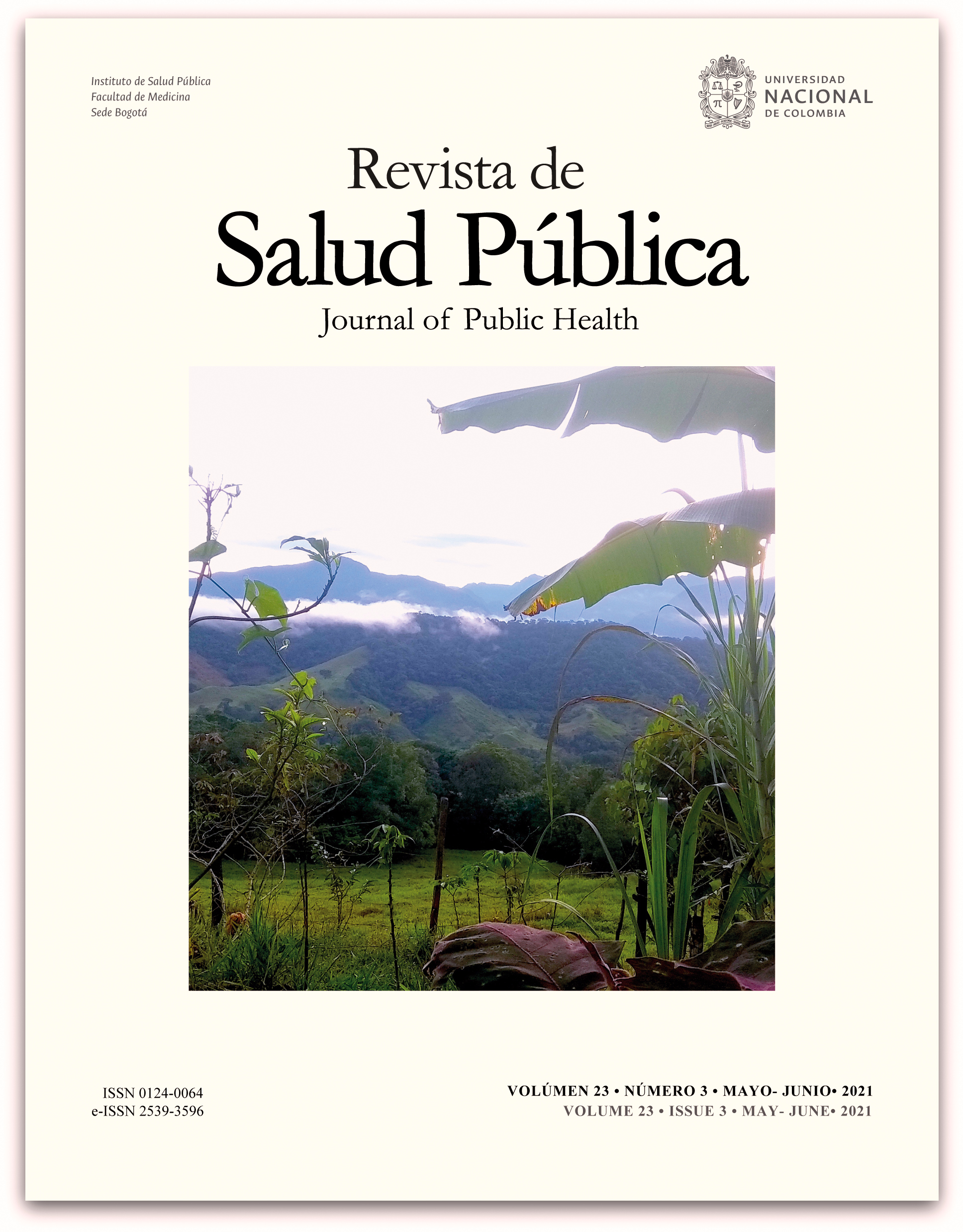Intervenciones nutricionales en la mejora de la cultura alimenticia y sostenibilidad en hondureños de primer año universitario
Nutritional interventions in the improvement of food culture and sustainability in Honduran first-year university students
DOI:
https://doi.org/10.15446/rsap.v23n3.91627Keywords:
Dieta mediterránea, dieta saludable, educación alimentaria y nutricional, patrones alimentarios (es)Diet mediterranean, diet, healthy, food and nutrition education, feeding behaviour (en)
Downloads
Objetivo Evaluar el efecto de intervenciones educativas en la mejora de hábitos alimenticos y adherencia a una dieta saludable y sostenible (dieta mediterránea) en universitarios hondureños en época de COVID-19. La emancipación del hogar ocasiona que los estudiantes universitarios se enfrenten a un nuevo entorno para la planificación de su alimentación durante la transición a su vida universitaria.
Métodos Se realizó un estudio observacional de cohorte descriptivo transversal entre febrero y junio 2020. Los datos presentados se derivan de encuestas de conductas alimenticias y adherencia a la dieta mediterránea (DM) antes y después de intervenciones educativas nutricionales.
Resultados El grupo con intervenciones mejoró sus conductas alimenticias pasando de poco saludables (media: 14,4) a moderadamente saludables (media: 17,3); de igual forma sucedió en la adherencia a la DM, pasando de baja adherencia (media: 7,6) a adherencia media (media: 8,3). En el grupo control no cambió su adherencia, manteniéndose en baja adherencia; tampoco cambiaron sus hábitos alimenticios, manteniéndose en hábitos poco saludables (p=0,068).
Conclusiones Existe evidencia de que el patrón dietético mediterráneo puede ser una opción para reducir los problemas de salud, especialmente, en la época de pandemia, por lo cual esta investigación expuso que un patrón alimenticio mediterráneo puede coexistir en un ambiente latinoamericano una vez que se conocen sus beneficios.
Objective To evaluate the effect of educational interventions on improving eating habits and adherence to the Mediterranean diet in Honduran university students during the time of COVID-19. The emancipation of the home makes university students face a new environment for planning their diet during the transition to their university life.
Methods An observational cross-sectional descriptive cohort study was conducted between February and June 2020. The data presented in this study are derived from surveys of eating behaviors and adherence to the Mediterranean diet (DM) before and after nutritional educational interventions in the COVID-19 pandemic.
Results The group with interventions improved their eating behaviors going from unhealthy (median: 14,4) to moderately healthy (median: 17,3); in the same way, it happened in the adherence to DM, going from low adherence (median: 7,6) to medium adherence (median: 8,3). In the control group, their adherence did not change, maintaining low adherence, nor their eating habits, remaining in unhealthy habits.
Conclusions There is evidence that the Mediterranean dietary pattern may be an option to reduce health problems, especially in times of pandemic, which is why thisresearch showed that a foreign dietary pattern can coexist in a Latin-American environment once its benefits are known.
References
Kearney J. Food consumption trends and drivers. Philos Trans R Soc B Biol Sci. 2010; 365(1554):2793-807. https://doi.org/10.1098/rstb.2010.0149. DOI: https://doi.org/10.1098/rstb.2010.0149
Hilger-Kolb J, Diehl K. ‘Oh God, I Have to Eat Something, But Where Can I Get Something Quickly?’—A Qualitative Interview Study on Barriers to Healthy Eating among University Students in Germany. Nutrients. 2019; 11(10):2440. https://doi.org/10.3390/nu11102440. DOI: https://doi.org/10.3390/nu11102440
Abraham S, Noriega BR, Shin JY. College students eating habits and knowledge of nutritional requirements. J Nutr Hum Health. 2018; 2(1):13-7. https://doi.org/10.35841/nutrition-human-health.2.1.13-17. DOI: https://doi.org/10.35841/nutrition-human-health.2.1.13-17
United Nations System Standing Committee on Nutrition. [Sustainable diets for a healthy population and planet] [Internet]. New York: UNSCN; 2017 [cited 2020 Sep 5]. https://bit.ly/2DW5Fmt.
Márquez-Sandoval YF, Salazar-Ruiz EN, Macedo-Ojeda G, Altamirano-Martínez M-O, Bernal-Orozco MF, Salas-Salvadó J, et al. [Design and validation of a questionnaire to assess dietary behavior in Mexican students in the area of health]. Nutr Hosp. 2014; 30(1):153-64. https://doi.org/10.3305/nh.2014.30.1.7451.
Martínez-González MA, Salas-Salvadó J, Estruch R, Corella D, Fitó M, Ros E, et al. Benefits of the Mediterranean diet: insights from the PREDIMED study. Prog Cardiovasc Dis. 2015; 58(1):50-60. https://doi.org/10.1016/j.pcad.2015.04.003. DOI: https://doi.org/10.1016/j.pcad.2015.04.003
Benítez-Benítez AM, Sánchez S, Franco-Reynolds L, Bermejo ML, Cubero J. [Adherence to the Mediterranean diet in students of the University of Extremadura: a resource in health education]. Rev Fund Educ Med [Internet]. 2016 [cited 2020 Nov 30]; 19(6):287-9. https://bit.ly/3UlU4AL. DOI: https://doi.org/10.33588/fem.196.862
Hekler EB, Gardner CD, Robinson TN. Effects of a college course about food and society on students' eating behaviors. Am J Prev Med. 2010; 38(5):543-7. https://doi.org/10.1016/j.amepre.2010.01.026. DOI: https://doi.org/10.1016/j.amepre.2010.01.026
Boyle JR, LaRose NR. Personal beliefs, the environment and college students' exercise and eating behaviors. Am J Health Stud [Internet]. 2008 [cited 2020 Nov 30]; 23(4):195-200. https://bit.ly/3EIwd8s.
Paslakis G, Dimitropoulos G, Katzman DK. A call to action to address COVID-19-induced global food insecurity to prevent hunger, malnutrition, and eating pathology. Nutr Rev. 2021; 79(1):114-6. https://doi.org/10.1093/nutrit/nuaa069. DOI: https://doi.org/10.1093/nutrit/nuaa069
Trautmann J, Rau SI, Wilson MA, Walters C. Vegetarian students in their first year of college: Are they at risk for restrictive or disordered eating behaviors? Coll Stud J. 2008; 42(2):340-7.
Sogari G, Velez-Argumedo C, Gómez MI, Mora C. College students and eating habits: A study using an ecological model for healthy behavior. Nutrients. 2018; 10(12):1823. https://doi.org/10.3390%2Fnu10121823. DOI: https://doi.org/10.3390/nu10121823
Reed JA, Powers A, Greenwood M, Smith W, Underwood R. Using “point of decision” messages to intervene on college students' eating behaviors. Am J Health Promot. 2011; 25(5):298-300. https://doi.org/10.4278/ajhp.090511-arb-162. DOI: https://doi.org/10.4278/ajhp.090511-ARB-162
Lockwood P, Wohl R. The impact of a 15-week lifetime wellness course on behavior change and self-efficacy in college students. Coll Stud J. 2012;46(3):628-41.
Neumark-Sztainer D, Wall M, Story M, Fulkerson JA. Are family meal patterns associated with disordered eating behaviors among adolescents? J Aadolesc Health. 2004; 35(5):350-9. https://doi.org/10.1016/j.jadohealth.2004.01.004. DOI: https://doi.org/10.1016/j.jadohealth.2004.01.004
Beasley SE. Country Roads Take Me ...?: A Cultural Analysis of College Pathways among Rural, First-Generation Students. In: Youn TIK (ed.), Paradoxes of the Democratization of Higher Education (Research in Social Problems and Public Policy). Bingley: Emerald Group Publishing; 2016. p. 127-63. DOI: https://doi.org/10.1108/S0196-115220160000022005
Barad A, Cartledge A, Gemmill K, Misner NM, Santiago CE, Yavelow M, et al. Associations between intuitive eating behaviors and fruit and vegetable intake among college students. J Nutr Educ Behav. 2019; 51(6):758-62. https://doi.org/10.1016/j.jneb.2019.03.010. DOI: https://doi.org/10.1016/j.jneb.2019.03.010
Flaudias V, Iceta S, Zerhouni O, Rodgers RF, Billieux J, Llorca P-M, et al. COVID-19 pandemic lockdown and problematic eating behaviors in a student population. J Behav Addict. 2020; 9(3):826-35. https://doi.org/10.1556/2006.2020.00053. DOI: https://doi.org/10.1556/2006.2020.00053
Rathi N, Riddell L, Worsley A. Barriers to nutrition promotion in private secondary schools in Kolkata, India: perspectives of parents and teachers. Int J Environ Res Public Health. 2018; 15(6):1139. https://doi.org/10.3390/ijerph15061139. DOI: https://doi.org/10.3390/ijerph15061139
Hardcastle SJ, Thøgersen-Ntoumani C, Chatzisarantis NLD. Food Choice and Nutrition: A Social Psychological Perspective. Nutrients. 2015; 7(10):8712-5. https://doi.org/10.3390/nu7105424. DOI: https://doi.org/10.3390/nu7105424
Sproesser G, Kohlbrenner V, Schupp H, Renner B. I eat healthier than you: differences in healthy and unhealthy food choices for oneself and for others. Nutrients. 2015; 7(6):4638-60. https://doi.org/10.3390/nu7064638. DOI: https://doi.org/10.3390/nu7064638
Lopez RB, Hofmann W, Wagner DD, Kelley WM, Heatherton TF. Neural predictors of giving in to temptation in daily life. Psychol Sci. 2014; 25(7):1337-44. https://doi.org/10.1177/0956797614531492. DOI: https://doi.org/10.1177/0956797614531492
Ali K, Fassnacht DB, Farrer L, Rieger E, Feldhege J, Moessner M, et al. What prevents young adults from seeking help? Barriers toward help-seeking for eating disorder symptomatology. Int J Eat Disord. 2020; 53(6):894-906. https://doi.org/10.1002/eat.23266. DOI: https://doi.org/10.1002/eat.23266
Weissman RS, Bauer S, Thomas JJ. Access to evidence-based care for eating disorders during the COVID-19 crisis. Int J Eat Disord. 2020; 53(5):369-76. https://doi.org/10.1002/eat.23279. DOI: https://doi.org/10.1002/eat.23279
Brewis A, Brennhofer S, van Woerden I, Bruening M. Weight stigma and eating behaviors on a college campus: Are students immune to stigma's effects? Prev Med Rep. 2016; 4:578-84. https://doi.org/10.1016/j.pmedr.2016.10.005. DOI: https://doi.org/10.1016/j.pmedr.2016.10.005
Folkvord F, Anschütz DJ, Boyland E, Kelly B, Buijzen M. Food advertising and eating behavior in children. Curr Opin Behav Sci. 2016; 9:26- 31. https://doi.org/10.1016/j.cobeha.2015.11.016. DOI: https://doi.org/10.1016/j.cobeha.2015.11.016
Fernández-Aranda F, Casas M, Claes L, Bryan DC, Favaro A, Granero R, et al. COVID-19 and implications for eating disorders. Eur Eat Disord Rev. 2020; 28(3):239-45. https://doi.org/10.1002/erv.2738. DOI: https://doi.org/10.1002/erv.2738
Sofi F, Cesari F, Abbate R, Gensini GF, Casini A. Adherence to Mediterranean diet and health status: meta-analysis. BMJ. 2008; 337:a1344. https://doi.org/10.1136/bmj.a1344. DOI: https://doi.org/10.1136/bmj.a1344
Willett WC. The Mediterranean diet: science and practice. Public Health Nutr. 2006; 9(1A):105-10. https://doi.org/10.1079/phn2005931. DOI: https://doi.org/10.1079/PHN2005931
Ntanasi E, Yannakoulia M, Kosmidis M, Anastasiou C, Dardiotis E, Hadjigeorgiou G, et al. Adherence to mediterranean diet and frailty. J Am Med Dir Assoc. 2018; 19(4):315-22. https://doi.org/10.1016/j.jamda.2017.11.005. DOI: https://doi.org/10.1016/j.jamda.2017.11.005
Bonaccio M, Di Castelnuovo A, Costanzo S, De Lucia F, Olivieri M, Donati M, et al. Nutrition knowledge is associated with higher adherence to Mediterranean diet and lower prevalence of obesity. Results from the Moli-sani study. Appetite. 2013; 68:139-46. https://doi.org/10.1016/j.appet.2013.04.026. DOI: https://doi.org/10.1016/j.appet.2013.04.026
Henríquez-Sánchez P, Ruano C, de Irala J, Ruiz-Canela M, Martínez-González MA, Sánchez-Villegas A. Adherence to the Mediterranean diet and quality of life in the SUN Project. Eur J Clin Nutr. 2012; 66(3):360-8. https://doi.org/10.1038/ejcn.2011.146. DOI: https://doi.org/10.1038/ejcn.2011.146
How to Cite
APA
ACM
ACS
ABNT
Chicago
Harvard
IEEE
MLA
Turabian
Vancouver
Download Citation
License

This work is licensed under a Creative Commons Attribution 4.0 International License.
This journal provides immediate free access to its content under the principle that making research available to the public free of charge supports a greater exchange of global knowledge.
All contents of this journal, except where identified, are published under a Creative Commons Attribution 4.0 License




















